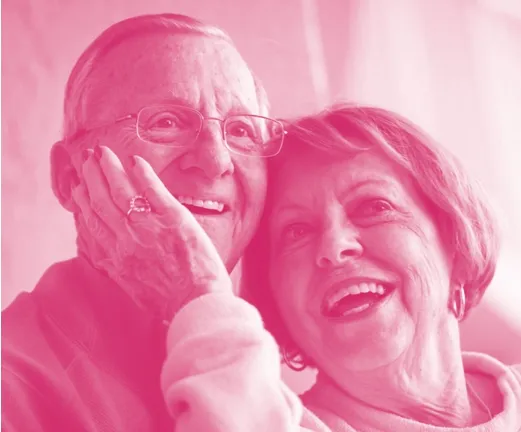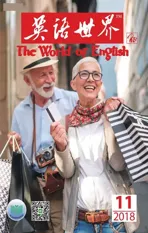How the Elderly Are Treated Around the World
2018-11-28By
By
A new “Elderly Rights Law” passed in China wags a finger at1wag a finger at对某人指指点点。adult children,warning them to “never neglect or snub2snub冷落。elderly people” and mandating3mandate要求;规定。that they visit their elderly parents often,regardless of how far away they live.The law includes enforcement mechanisms,too: Offspring who fail to make such trips to mom and dad face potential punishment ranging from fines to jail time.
中国新通过的老年人权益保障法将矛头指向成年子女,警告他们“不得忽视、冷落老年人”,并规定无论子女离家多远,都应经常看望年迈父母。该保障法还规定了执法机制:未按规定看望父母的,可处以罚款或监禁。
[2]How cultures view and treat their elderly is closely linked to their most prized values and traits.Here’s what we can learn from other cultures,both past and present,about embracing the aging process.
[2]各种文化如何看待和对待老人,与该文化最重视的价值观和品质关系密切。下面,就让我们来一起学习古今中外各种文化是如何对待老人的。
In the U.S.and U.K.,protestantism4 protestantism新教,又称基督教新教,是西方基督教中不属于天主教体系的宗派的统称,源于16世纪神学家马丁·路德等人所领导的宗教改革运动。 is at play
英美两国受新教影响
[3]Western cultures tend to be youthcentric,emphasizing attributes like individualism and independence.This relates back to the Protestant work ethic5新教工作伦理是一个关于西方基督教新教社会和经济理论的概念。它强调努力工作是一个人的使命,世俗的成功可以作为个人超度的一个标志。,which ties an individual’s value to his or her ability to work—something that diminishes in old age.Anthropologist6anthropologist人类学家。Jared Diamond,who has studied the treatment of the elderly across cultures,has said the geriatric7geriatric n.老年人;adj.衰老的。in countries like the U.K.and U.S.live “lonely lives separated from their children and lifelong friends.” As their health deteriorates,the elderly in these cultures often move to retirement communities,assisted living8assisted living赡养院;安养照护。facilities,and nursing homes9nursing home小型私立疗养院;(尤指)私立养老院。.
[3]西方文化往往以年轻人为中心,强调个人主义和独立自主等特质,这一点与新教工作伦理有关。新教工作伦理把个人价值和工作能力挂钩,而工作能力在晚年会降低。人类学家贾德·戴蒙曾研究不同文化对待老人的态度,称英美等国的老人过着“远离子女和老友的孤独生活”。随着健康状况恶化,这些老人通常会搬到退休社区、养老院和私立疗养院生活。

In France,parents are also protected by law
法国老人亦受法律保护
[4]It’s difficult to imagine such an Elderly Rights Law being a legislative priority in many Western cultures.France did,however,pass a similar decree in 2004 (Article 207 of theCivil Code)requiring its citizens to keep in touch with their geriatric parents.It was only enacted following two disturbing events,though: One was the publication of statistics revealing France had the highest rate of pensioner suicides in Europe,and the other was the aftermath of a heat wave that killed 15,000 people—most of them elderly,and many of whom had been dead for weeks before they were found.
[4]很难想象,这样的老年人权益保障法会成为许多西方国家的立法重点。但法国的确在2004年通过了一项类似法令——《民法典》第207条,要求公民与年迈父母保持联系。但这条法令是在两起令人不安的事件发生后才颁布的:一是法国曾公布一组数据,显示法国是欧洲退休老人自杀率最高的国家;二是法国出现的一股热浪导致15000人死亡,其中大部分是老人,而且很多人在死后数周才被发现。
“Old man” isn’t a bad word in Greek
希腊语“老人”无负面含义
[5]The Western cultural stigma10around aging and death doesn’t exist in Greece.In Greek and Greek-American culture,old age is honored and celebrated,and respect for elders is central to the family.
[5]西方文化中伴随年老和死亡的耻感在希腊并不存在。在希腊人和希腊裔美国人眼中,年老是一件光荣和值得庆祝的事,敬重老人是家庭的核心。
[6]Arianna Huffington described an experience of Greek elderly respect in her book,On Becoming Fearless:
Ten years ago I visited the monastery of Tharri on the island of Rhodes with my children.There,as in all of Greece,abbots11 are addressed by everyone as‘Geronda’,which means ‘old man.’ Abbesses12 are called ‘Gerondissa.’ Not exactly terms of endearment in my adopted home.The idea of honoring old age,indeed identifying it with wisdom and closeness to God,is in startling contrast to the way we treat aging in America.
[6]阿里安娜·赫芬顿在其著作《无所畏惧》中描写了一段希腊老人受社会尊重的经历:
十年前,我和孩子们一起参观了希腊罗德岛的塔里修道院。在希腊,男修道院院长被称为Geronda,女修道院院长被称为Gerondissa,两个词的意思均为“老人”。但在我的第二故乡美国却没有这样的尊称。希腊人敬老,将年迈与智慧和亲近上帝联系在一起,这种想法与我们在美国对待年老的方式形成了鲜明对比。
[7]In both Mediterranean and Latin cultures,it’s commonplace for multiple generations to live under one roof,(à laMy Big Fat Greek Wedding)sharing a home and all the duties that come with maintaining one.In the contemporary iteration13of this living arrangement,the oldest generation often is elied onto assist with caring for the youngest,while the breadwinners labor outside the home.As such,the aged remain thoroughly integrated well into their last days.
[7]在地中海和拉丁文化中,多代同堂的现象非常普遍(见《我盛大的希腊婚礼》),一大家人同住一个屋檐下,共同分担维系一个家庭所需承担的所有责任。现如今,在这样的多代同堂家庭里,老人通常负责照看小孩,年轻人则在外挣钱,养家糊口。这样,老人一辈子都和家人生活在一起。
Native American elders pass down their knowledge
美洲原住民老人传递后代知识
[8]Though attitudes towards death in contemporary American culture are largely characterized by fear,Native American cultures traditionally accept death as a fact of life.
[8]尽管在当代美国文化中,大部分人谈死色变,但传统上,美洲原住民却认为死亡是一件自然而然的事。
[9]There are over 500 Native American nations,and each has its own traditions and attitudes toward aging and elderly care.But in many tribal communities,elders are respected for their wisdom and life experiences.Within Native American families,it’s common for the elders to be expected to pass down their learnings to younger members of the family,according to the University of Missouri,Kansas City.
[9]美洲有500多个原住民民族,每个民族对年老和养老都有自己的传统和态度。但在很多部落里,老人因其智慧和生活经历而受到尊重。据密苏里大学堪萨斯分校研究发现,在美洲原住民家庭里,通常由长者把知识传给家里的年轻人。
Chinese children care for their parents in old age
中国子女照顾年迈父母
[10]Chinese families traditionally view filial piety and respect for one’s elders as the highest virtue,deriving from the Confucian tradition.Adult children are generally expected to care for their parents in their old age.
[10]按照儒家传统,中国家庭将孝顺和尊敬老人视为做人的最高美德。成年子女通常需要照看年迈的父母。
[11]However,this tradition is beginning to break down14break down崩溃;分解。in China,due to rising life expectancy and an aging population.Nursing homes are beginning to become a more socially acceptable option for elderly care.
[11]但由于预期寿命增加和人口老龄化,这种传统在中国开始瓦解。去养老院开始成为更被人接受的养老选择。

South Koreans celebrate old age
韩国人庆祝晚年
[12]Much of the Korean regard for aging is rooted in the Confucian principle of filial piety,a fundamental value dictating that one must respect one’s parents (although Confucius was Chinese,Confucianism has a long history in South Korea).Younger members of the family have a duty to care for the aging members of the family.And even outside the family unit,South Koreans are socialized to respect and show deference to older individuals as well as authority figures.
[12]韩国人对老年的态度深受儒家孝道的影响。孝是儒家最基本的一个价值观,规定人必须孝敬父母(尽管孔子是中国人,但儒家思想在韩国有着悠久的历史)。年轻人有义务照顾家中的长者。即便走出家门,韩国人在社交场合也被要求尊敬和服从长者及权威人士。
[13]It’s also customary in South Korea to have a big celebration to mark an individual’s 60th and 70th birthdays.Thehwan-gap,or 60th birthday,is a joyous time when children celebrate their parents’ passage into old age.The age is thought to be reason for celebration in part because many of their ancestors would not have survived past the age of 60 without the advances of modern medicine.A similar large family celebration is held for the 70th birthday,known askohCui(“old and rare”).
[13]庆祝六十和七十大寿也是韩国人的习俗。甲子或六十大寿是子女庆祝父母步入晚年的喜庆日子。之所以庆祝六十大寿,部分原因在于,许多韩国人在现代医学取得进步之前活不过六十岁。另外一个举家欢庆的日子是七十大寿,也被称作“古稀之年”。
Japan faces an elderly predicament15
日本面临老龄困局
[14]Like the Chinese and the Koreans,the Japanese prize filial piety and expect children to dutifully tend to their parents.But Japan also faces the unique problem of tending to an increasingly elderly population.According toSocial Gerontology16: A Multidisciplinary Perspective,7.2 percent of the Japanese population will be 80 or older in 2020 (compared to 4.1 percent in the U.S.),which will likely lead to a host of new problems for the country.Adult diapers are already outselling17baby diapers,and the pension system is on course to dry up.
[14]日本人跟中国人和韩国人一样重视孝道,要求子女孝敬父母。但日本同样也面临着人口老龄化的特殊问题。《社会老年学:跨学科视角》一书指出,到2020年,7.2%的日本人将年满或超过80岁(美国的这一比例为4.1%),这很可能给日本带来一系列新的问题。在日本,成人纸尿裤的销量已超过婴儿纸尿裤,且养老金体系濒临崩溃。
In India,elders are the head of the family.
印度老人是一家之长
[15]Many Indians live in joint family units,with the elders acting as the head of the household.The elders are supported by the younger members of the family and they in turn play a key role in raising their grandchildren.
[15]许多印度人住在数代同堂的大家庭里,老人是一家之长。年轻人赡养老人,老人则主要负责抚养小孩。
[16]“Advice is always sought from them on a range of issues,from investment of family money to nitty-gritties18of traditional wedding rituals and intrafamily conflicts.And this is not just passive advice;their word is final in settling disputes,” Achyut Bihani wrote inSlate19.“The elderly are often the most religious and charitable members of the family.”
[16]阿奇优特·毕哈尼在美国Slate杂志上写道:“家中的大小事务都会向老人征求意见,从家庭投资到传统婚礼仪式的具体细节和家庭内部冲突,不一而足。而且老人的意见并不是听听就算了,如何解决纠纷,最终是他们说了算。老人通常是家里最虔诚慈爱的人。”
[17]Disrespecting the elders of the family or sending them to an old-age home has a social stigma in India,Bihani adds.
[17]毕哈尼还写道,在印度,不尊重家中老人或把老人送到养老院是件不光彩的事。
In the African-American community,death is seen as an opportunity to celebrate life.
非裔美国人借死亡赞颂生命
[18]In African-American culture,death is seen as part of the “natural rhythm of life,” which lessens the cultural fear around aging.For this reason,Karen H.Meyers writes inThe Truth About Death and Dying,“African-American funerals tend to be life-affirming and to have a celebratory air intermingled with the sorrow.” ■
[18]非洲裔美国人认为死亡是“生命自然的节奏”,这种想法减轻了人们对于衰老的恐惧。正因如此,凯伦·H.迈尔斯在《死亡与垂死的真相》一书中写道,“非洲裔美国人的葬礼往往令人振奋,欢庆中夹杂着哀伤。” □
讣 告
我刊编委郝启成教授2018年9月11日因病医治无效在河北秦皇岛去世,享年77岁。郝启成教授1941年生,吉林大安人,1966年毕业于北京外国语学院,曾任东北大学秦皇岛分校外语系主任、吉林省翻译工作者协会常务理事、吉林省作家协会会员等职务,主要译作有《死亡勋章》《抓间谍的人》《总统的隐私》《女劳务间谍》等,另著译中短篇文学、戏剧、民间文学、论文等数十篇,人名入选《中国科技翻译家辞典》。
多年来郝老师给予《英语世界》极大支持,孜孜不倦为本刊翻译或审校高质量译文多篇,深受我们敬重。我们对这位挚友的离世表示沉痛哀悼。
《英语世界》杂志社
2018年9月
(译者曾获第五届“《英语世界》杯”翻译大赛二等奖)
